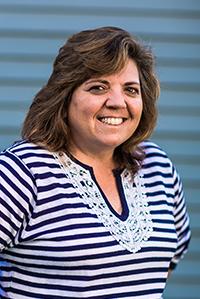Genetic Counseling Graduates Final Class
During the Grad-AWAY-tion ceremony on May 15, Arcadia University graduated its final Master of Science in Genetic Counseling class, the 24th graduating class in program history. This follows the July 2019 transfer of sponsorship, accreditation, curriculum, and faculty of Arcadia’s Genetic Counseling program to the Perelman School of Medicine at the University of Pennsylvania.

“While every graduating class is unique, this is a particularly momentous year as we celebrate the graduation of the Class of 2020,” said Kathy Valverde, professor and chair of Genetic Counseling. “This group has endured more than any other cohort at Arcadiawith grace, flexibility, and good humor, and we are so proud of them.”
Members of the Class of 2020 are beginning careers in their field around the country, including with Women and Infants Hospital in Providence, R.I., Children’s Hospital of Philadelphia, Inova healthcare provider in Fairfax, Va., Integrated Genetics at Lenox Hill Hospital in New York City, and Children’s Hospital Colorado in Denver, Colo. In total, 12 of the 16 graduates are starting full-time positions this summer.

“Coming into the program as the youngest in the class, I was worried about interactions with my peers,” said Briana Feirstein ’20M, who begins as a cancer genetic counselor at St. Luke’s University Health Network in Allentown, Pa., in July. “However, the past two years wouldn’t have been possible without the fostering of a close-knit environment with my peers. The friendships I created with my classmates are some of the closest I’ve had in my life.”
When the Genetic Counseling program was approved in 1994, it was only the 19th master’s program in the country. Valverde was hired as one of the first full-time faculty members for the program, joining the campus community with the first cohort in 1995. Since then, she’s seen the industry evolve to over 5,000 genetic counselors nationwide and 54 master’s of Genetic Counseling programs.
Valverde remembers teaching in 1995 about single-gene testing—which has since been replaced by panels, exomes, and genomes tests. As the field evolved, the program included new methods of testing. However, what has remained consistent is the importance of counseling as tests become more and more precise.
“In genetic counseling, we always talk to patients about uncertainty and how much tolerance they have for uncertainty,” said Valverde. “We deal a lot with uncertainty—if you have a baby, and the baby has this problem, what would it be like to raise the child? That’s all counseling, and that hasn’t changed so much. What’s changed is the type of testing and, on the flip side, the expectation. I think that a lot of people think that genetic counseling is just about testing, but it’s not just testing. It’s the implications of the testing.”
This is the challenge of kits like 23andMe, an at-home DNA test, where people can test their DNA for certain genetic markers. However, Valverde notes, without a genetic counselor to analyze the results the implications could be misunderstanding the results.

Moving forward, Valverde predicts the growth of telegenetics for a post-pandemic world, which would enable someone to chat with a genetic counselor if they were concerned about the implications of an at-home test or one done by their doctor. A practice that has existed for several years, Valverde said that since March telegenetics (a form of telehealth specific for genetic counseling) has grown in popularity. For this reason, as well as the suspension of clinical rotations, the Class of 2020 received the first telegenetics experiential learning opportunity when courses moved online during the spring semester.
“I did my cancer genetics rotation at Penn Medicine’s Pennsylvania Hospital the summer after my first year and loved my time in the clinic,” said Melissa Heller ’20, who will be returning to Pennsylvania Hospital full-time in June as a cancer genetic counselor. “While I only had a few telegenetics appointments through the program, I do feel like it was a valuable experience in adapting to our surroundings as we enter the world after COVID-19. I’m glad I had the chance to practice using different video platforms before entering the ‘real’ world.”

